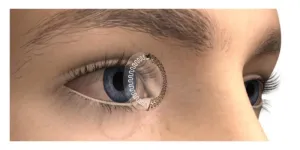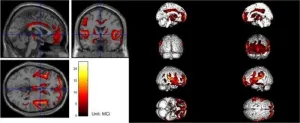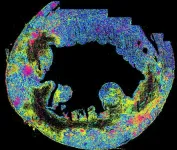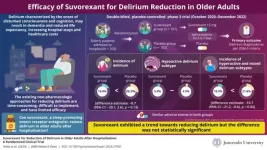(Press-News.org) LOS ANGELES, August 29, 2024 — Yangzhi Zhu, Ph.D., Assistant Professor at the Terasaki Institute for Biomedical Innovation (TIBI), has been awarded the prestigious 2024 NARSAD Young Investigator Grant for his groundbreaking work on a lab-on-a-contact lens (LoCL) system. This innovative technology is designed to monitor mental health by providing real-time, non-invasive tracking of panels of key biomarkers, from the wearer’s tears.
Mental health disorders, such as anxiety and depression, affect nearly a billion people worldwide and have worsened in the aftermath of the COVID-19 pandemic. Current diagnostic methods, which often rely on subjective reporting and require frequent clinic visits, are insufficient in addressing these issues. The LoCL technology aims to address this gap by offering a home-based solution that enables continuous, real-time monitoring of mental health biomarkers.
The NARSAD Young Investigator Grant, awarded by the Brain & Behavior Research Foundation, recognizes Dr. Zhu’s significant contributions to the field of mental health. The grant will support the ongoing clinical trial, which focuses on two key objectives:
Development of the LoCL System: Refining the LoCL technology to ensure accurate, efficient, and safe monitoring of multiple physiological parameters in real-time.
Human Pilot Studies: Evaluating the effectiveness of the LoCL system in tracking treatment outcomes for patients with depression and exploring its potential as a clinical tool for managing other mental health conditions.
“Mental health disorders now affect nearly a billion people worldwide. Current diagnostic methods, relying on subjective reporting and frequent clinic visits, are inadequate in addressing these growing challenges.” said Dr. Zhu. “This recognition through the NARSAD Young Investigator Grant underscores the importance of our work. Our LoCL technology represents a significant step forward in enabling early intervention and personalized treatment for mental health disorders.”
“This innovation has the potential to revolutionize mental health care, making it more accessible and precise,” added Ali Khademhosseini, CEO of TIBI. “I am very proud of Dr. Zhu and super excited about his upcoming research.”
The support from the NARSAD Young Investigator Grant will allow TIBI to continue advancing this transformative technology, paving the way for a new era in mental health care. The LoCL system is anticipated to offer a simple, cost-effective tool for early diagnosis and ongoing management of conditions such as anxiety, depression, bipolar disorder, and post-traumatic stress disorder.
###
For more information, please visit Terasaki.org or Contact:
Stewart Han
Email: shan@terasaki.org
Yangzhi Zhu
Email: yzhu@terasaki.org
About Terasaki Institute for Biomedical Innovation
The Terasaki Institute for Biomedical Innovation is a hub of excellence in the field of biomedical research and development. With a focus on innovative solutions to health challenges, the Institute is committed to the translation of scientific discoveries into practical applications that can enhance the quality of life for people around the globe.
END
Terasaki Institute scientist awarded 2024 NARSAD Young Investigator Grant
Developing breakthrough contact lens technology for mental health monitoring
2024-08-29
ELSE PRESS RELEASES FROM THIS DATE:
A breakthrough in diagnosing hydrocephalus: Multimodality approaches enhance accuracy and reduce costs
2024-08-29
A recent case report published in Cyborg Bionic Systems details the diagnosis of Idiopathic Normal Pressure Hydrocephalus (iNPH) using multimodality diagnostic approaches, highlighting significant advancements in medical diagnostics and patient care. The study conducted by a team of researchers from Tianjin Medical University General Hospital, Tianjin, China, presents a comprehensive case study of a 68-year-old male patient diagnosed with iNPH, showcasing the effectiveness of these advanced diagnostic techniques.
iNPH is a condition characterized by the accumulation of cerebrospinal fluid (CSF) causing ventricular dilation, ...
This tiny backyard bug does the fastest backflips on earth
2024-08-29
Move over, Sonic. There’s a new spin-jumping champion in town – the globular springtail (Dicyrtomina minuta). This diminutive hexapod backflips into the air, spinning to over 60 times its body height in the blink of an eye, and a new study features the first in-depth look at its jumping prowess.
Globular springtails are tiny, usually only a couple millimeters in body length. They don’t fly, bite or sting. But they can jump. In fact, jumping is their go-to (and only) plan for avoiding predators. And they excel at it – to the naked eye it seems as though they vanish entirely when they take off.
“When globular springtails ...
Climate change increases foodborne illness risk from raw produce
2024-08-29
Highlights:
Salmonella enterica causes disease in 1.2 million people in the U.S. annually.
The most common way people get infected is by consuming contaminated fresh produce.
New research shows that bacterial leaf spot of lettuce and high humidity promote S. enterica growth in lettuce, and climate change is predicted to increase humid periods.
Washington, D.C.—Climate change will increase the risk of the foodborne illness from Salmonella enterica, according to a new study. The research was published today in Applied and Environmental Microbiology, a journal of the American Society for Microbiology.
S. enterica causes disease in 1.2 million people in the ...
NSF Grant empowers FAU to explore Caribbean climate crisis with ethnography
2024-08-29
Transformations in the global climate system are profoundly destabilizing ecosystems across the Caribbean, with South Florida and Puerto Rico experiencing notable impacts. To address this challenge, researchers from Florida Atlantic University and the University of Puerto Rico (UPR) in Cayey, are turning to ethnography – an in-depth, immersive research method that involves observing and interviewing people in their natural settings.
FAU’s Dorothy F. Schmidt College of Arts and Letters, in collaboration with UPR Cayey, has received a $650,000 grant from ...
A bacterial defense with potential application in genome editing
2024-08-29
COLUMBUS, Ohio – Scientists who have described in a new study the step-by-step details of a bacterial defense strategy see the mechanism as a promising platform for development of a new genome-editing method.
The system involves two proteins that team up to disable plasmids, small DNA molecules that exchange genetic information among different bacterial strains. While plasmids provide evolutionary benefits, they can also be seen by host bacteria as threats.
The research team determined that one protein uses a short piece of DNA – known as a DNA guide – to ...
Labor day crowds temporarily impact local streams, research shows
2024-08-29
Crowds flocking to rivers and streams over Labor Day weekend are doing more than cooling off and having fun. They’re temporarily introducing chemicals and microscopic organisms into their local waterways, according to new research from Johns Hopkins University.
The research, published today in ACS ES&T Water, is the first holistic assessment of how recreation impacts streams. Findings also provide insight into the compounds and chemicals people are splashing around in when their favorite swimming spots are packed.
“Residue from ...
Borderzone Breakthrough: A new source of cardiac inflammation
2024-08-29
Ischemic heart disease is the most common cause of death in the world. It begins with a “heart attack”, also known as a myocardial infarction (MI), which causes part of the heart to die due to inadequate coronary blood flow. This leads to vigorous inflammation, heart wall remodeling, and heart failure.
Anti-inflammatory drugs have been surprisingly ineffective at preventing heart failure. As a consequence, they are not a routine part of post-MI care. However, it is possible that the most potent molecular and cellular inflammation targets have yet to be discovered.
In the Aug. 28, ...
New study assesses the efficacy of suvorexant in reducing delirium in older adults
2024-08-29
Delirium is a sudden onset and temporary state of disturbed consciousness or cognition, occurring due to underlying medical issues like fever or alcohol withdrawal. It is most common among older hospitalized adults aged 75 years or above, leading to increased risk of falls, dementia, low life expectancy, and high healthcare expenses.
Non-pharmacological approaches to prevent or reduce delirium are time-consuming, hard to implement, and partially effective. So, pharmacological interventions offer hope. Insomnia, a significant risk factor for delirium, could be alleviated with sleep-promoting medications. However, not all ...
Gene therapy gets a turbo boost from University of Hawaii researchers
2024-08-29
For decades, scientists have dreamt of a future where genetic diseases, such as the blood clotting disorder hemophilia, could be a thing of the past. Gene therapy, the idea of fixing faulty genes with healthy ones, has held immense promise. But a major hurdle has been finding a safe and efficient way to deliver those genes.
Now, researchers at the University of Hawaiʻi’s John A. Burns School of Medicine (JABSOM) have made a significant breakthrough in gene editing technology that could revolutionize how we treat genetic diseases. Their new method offers a faster, safer, and more efficient way to deliver healthy ...
Global timber supply threatened as climate change pushes cropland northwards
2024-08-29
Climate change will move and reduce the land suitable for growing food and timber, putting the production of these two vital resources into direct competition, a new study has found.
The sight of vineyards in Britain is becoming more common as hotter summers create increasingly suitable conditions for growing grapes. But behind this success story is a sobering one: climate change is shifting the regions of the world suitable for growing crops.
Researchers at the University of Cambridge have uncovered a looming issue: as the ...
LAST 30 PRESS RELEASES:
Yale study challenges notion that aging means decline, finds many older adults improve over time
Korean researchers enable early detection of brain disorders with a single drop of saliva!
Swipe right, but safer
Duke-NUS scientists identify more effective way to detect poultry viruses in live markets
Low-intensity treadmill exercise preconditioning mitigates post-stroke injury in mouse models
How moss helped solve a grave-robbing mystery
How much sleep do teens get? Six-seven hours.
Patients regain weight rapidly after stopping weight loss drugs – but still keep off a quarter of weight lost
GLP-1 diabetes drugs linked to reduced risk of addiction and substance-related death
Councils face industry legal threats for campaigns warning against wood burning stoves
GLP-1 medications get at the heart of addiction: study
Global trauma study highlights shared learning as interest in whole blood resurges
Almost a third of Gen Z men agree a wife should obey her husband
Trapping light on thermal photodetectors shatters speed records
New review highlights the future of tubular solid oxide fuel cells for clean energy systems
Pig farm ammonia pollution may indirectly accelerate climate warming, new study finds
Modified biochar helps compost retain nitrogen and build richer soil organic matter
First gene regulation clinical trials for epilepsy show promising results
Life-changing drug identified for children with rare epilepsy
Husker researchers collaborate to explore fear of spiders
Mayo Clinic researchers discover hidden brain map that may improve epilepsy care
NYCST announces Round 2 Awards for space technology projects
How the Dobbs decision and abortion restrictions changed where medical students apply to residency programs
Microwave frying can help lower oil content for healthier French fries
In MS, wearable sensors may help identify people at risk of worsening disability
Study: Football associated with nearly one in five brain injuries in youth sports
Machine-learning immune-system analysis study may hold clues to personalized medicine
A promising potential therapeutic strategy for Rett syndrome
How time changes impact public sentiment in the U.S.
Analysis of charred food in pot reveals that prehistoric Europeans had surprisingly complex cuisines
[Press-News.org] Terasaki Institute scientist awarded 2024 NARSAD Young Investigator GrantDeveloping breakthrough contact lens technology for mental health monitoring







